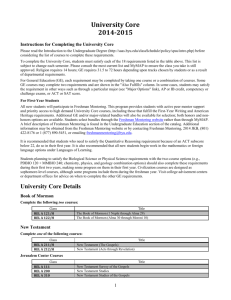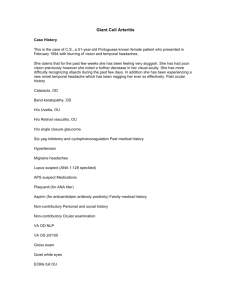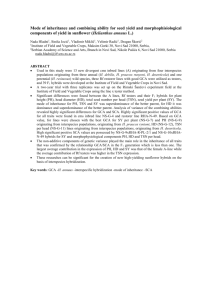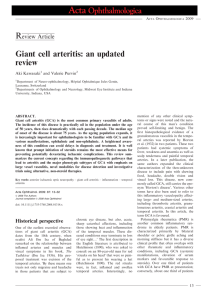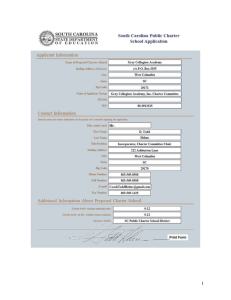Patient reported outcomes in Giant Cell Arteritis: Understanding the
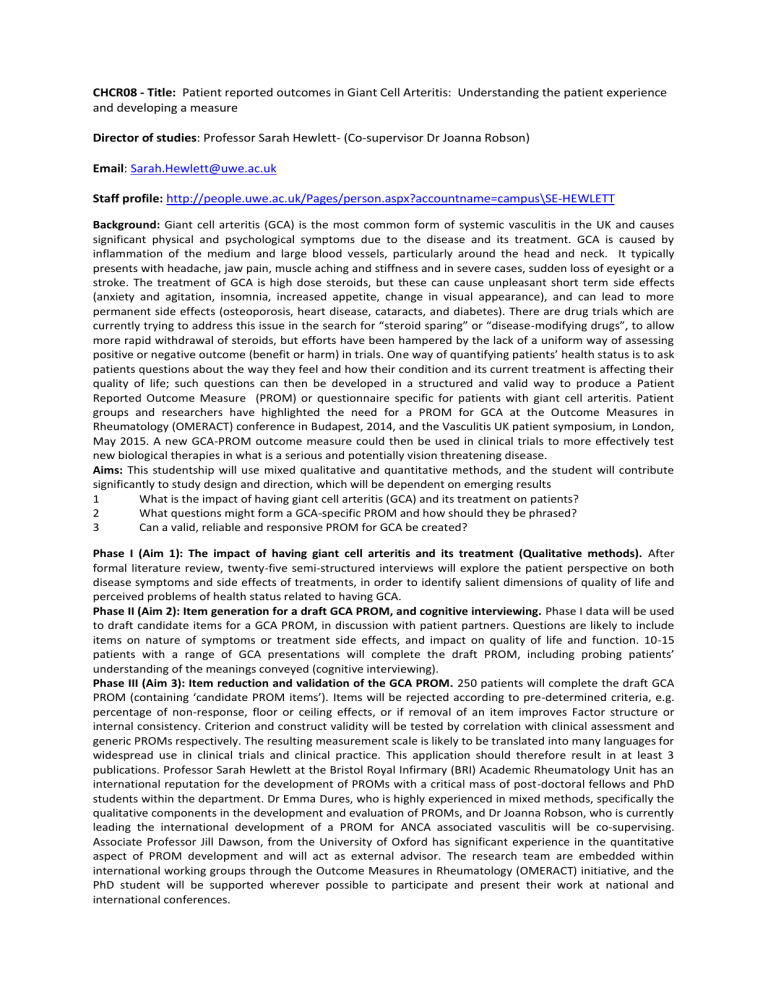
CHCR08 - Title: Patient reported outcomes in Giant Cell Arteritis: Understanding the patient experience and developing a measure
Director of studies: Professor Sarah Hewlett- (Co-supervisor Dr Joanna Robson)
Email: Sarah.Hewlett@uwe.ac.uk
Staff profile: http://people.uwe.ac.uk/Pages/person.aspx?accountname=campus\SE-HEWLETT
Background: Giant cell arteritis (GCA) is the most common form of systemic vasculitis in the UK and causes significant physical and psychological symptoms due to the disease and its treatment. GCA is caused by inflammation of the medium and large blood vessels, particularly around the head and neck. It typically presents with headache, jaw pain, muscle aching and stiffness and in severe cases, sudden loss of eyesight or a stroke. The treatment of GCA is high dose steroids, but these can cause unpleasant short term side effects
(anxiety and agitation, insomnia, increased appetite, change in visual appearance), and can lead to more permanent side effects (osteoporosis, heart disease, cataracts, and diabetes). There are drug trials which are currently trying to address this issue in the search for “steroid sparing” or “disease-modifying drugs”, to allow more rapid withdrawal of steroids, but efforts have been hampered by the lack of a uniform way of assessing positive or negative outcome (benefit or harm) in trials. One way of quantifying patients’ health status is to ask patients questions about the way they feel and how their condition and its current treatment is affecting their quality of life; such questions can then be developed in a structured and valid way to produce a Patient
Reported Outcome Measure (PROM) or questionnaire specific for patients with giant cell arteritis. Patient groups and researchers have highlighted the need for a PROM for GCA at the Outcome Measures in
Rheumatology (OMERACT) conference in Budapest, 2014, and the Vasculitis UK patient symposium, in London,
May 2015. A new GCA-PROM outcome measure could then be used in clinical trials to more effectively test new biological therapies in what is a serious and potentially vision threatening disease.
Aims: This studentship will use mixed qualitative and quantitative methods, and the student will contribute significantly to study design and direction, which will be dependent on emerging results
1
2
3
What is the impact of having giant cell arteritis (GCA) and its treatment on patients?
What questions might form a GCA-specific PROM and how should they be phrased?
Can a valid, reliable and responsive PROM for GCA be created?
Phase I (Aim 1): The impact of having giant cell arteritis and its treatment (Qualitative methods). After formal literature review, twenty-five semi-structured interviews will explore the patient perspective on both disease symptoms and side effects of treatments, in order to identify salient dimensions of quality of life and perceived problems of health status related to having GCA.
Phase II (Aim 2): Item generation for a draft GCA PROM, and cognitive interviewing. Phase I data will be used to draft candidate items for a GCA PROM, in discussion with patient partners. Questions are likely to include items on nature of symptoms or treatment side effects, and impact on quality of life and function. 10-15 patients with a range of GCA presentations will complete the draft PROM, including probing patients’ understanding of the meanings conveyed (cognitive interviewing).
Phase III (Aim 3): Item reduction and validation of the GCA PROM. 250 patients will complete the draft GCA
PROM (containing ‘candidate PROM items’). Items will be rejected according to pre-determined criteria, e.g. percentage of non-response, floor or ceiling effects, or if removal of an item improves Factor structure or internal consistency. Criterion and construct validity will be tested by correlation with clinical assessment and generic PROMs respectively. The resulting measurement scale is likely to be translated into many languages for widespread use in clinical trials and clinical practice. This application should therefore result in at least 3 publications. Professor Sarah Hewlett at the Bristol Royal Infirmary (BRI) Academic Rheumatology Unit has an international reputation for the development of PROMs with a critical mass of post-doctoral fellows and PhD students within the department. Dr Emma Dures, who is highly experienced in mixed methods, specifically the qualitative components in the development and evaluation of PROMs, and Dr Joanna Robson, who is currently leading the international development of a PROM for ANCA associated vasculitis will be co-supervising.
Associate Professor Jill Dawson, from the University of Oxford has significant experience in the quantitative aspect of PROM development and will act as external advisor. The research team are embedded within international working groups through the Outcome Measures in Rheumatology (OMERACT) initiative, and the
PhD student will be supported wherever possible to participate and present their work at national and international conferences.








